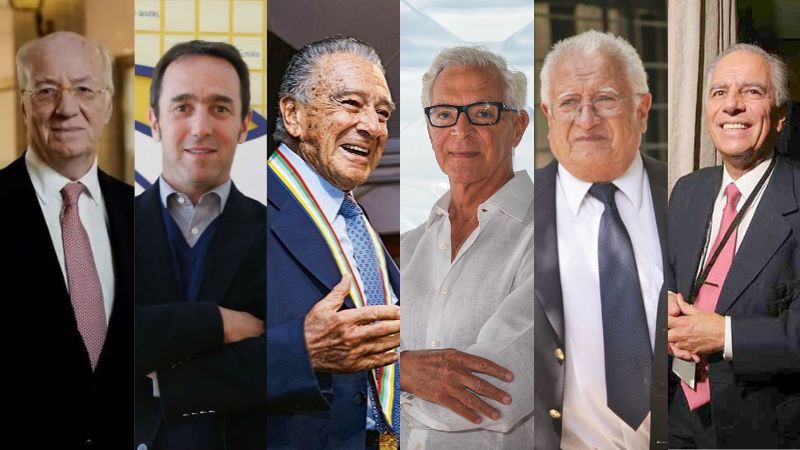
The “myth of scarcity” and the Forbes magazine ranking. Editorial of “El Círculo Rojo”, a program on La Izquierda Diario that broadcasts on Thursdays from 10 p.m. to midnight on Radio Con Vos, 89.9.
- A rhetorical device used by practically all expressions of the extreme right internationally is the one that tries to establish an “imaginary of scarcity.” The Government of Javier Milei—it must be recognized—was relatively successful in installing this idea, at least in a segment of the population.
- What is the “imaginary of scarcity”? Well, the simple idea that “there is no money” or that the existing resources “are not enough for everyone”, that they are scarce and that we must shrink, adjust to adapt to that reality that has the force of a natural law.
- This resource is accompanied by another that attempts to direct the anger or discomfort that the same lack of possibilities generates, downwards or, at most, to the sides. Promote a dispute between the penultimate against the last—or against their peers—to become the legitimate creditor of some of those scarce resources and hold those “others” responsible for the “waste” that led us here.
- These “others” can be state employees, picketers, those who “live off the plans” or, simply, the poor. In many countries where immigration is a constant, racism or xenophobia is targeted against the migrant population. In others, like ours (in which this also exists, especially against immigrants from some neighboring countries) the poor are directly targeted. The Spanish philosopher Adelina Cortina baptized this attitude and this ideology—which is a direct product of savage neoliberalism—as “aporophobia” (something like “fear or aversion to the poor”).
- Be careful, this “imaginary of scarcity” (I insist, of which not the entire population is convinced, but a considerable part is) does not emerge overnight. It is built over time. First, due to the existence and increasingly widespread extension of poverty, precariousness, and destitution. The expulsion or marginalization of many of these people from the world of work, then from the centers of socialization that are the cities (they are people who have less and less right to the city), to finally construct them as an “other” and burden them with all responsibilities for the shortage, for the crisis, for the problems.
- But, in addition, there is an ideological-political construction of that imaginary of which Milei and the libertarian discourse are an extreme, brutal, direct, unfiltered expression, but which was already present in other previous discourses. For example, in all those who in recent years built “the adjustment consensus.” Although some said that it had to be done gradually, others more accelerated and others (like Milei) directly with the shock method, the subtext of all those stories said: “they are living beyond their means.” That it was necessary to adjust, that in our reality there was something precisely that was not real and that we had to put an end to that “lie” or that “fiction.”
- All this presupposes a double naturalization process: the naturalization of poverty and, more importantly, the naturalization of wealth. The ideological operation has to be based on considering “natural” the enormous enrichment of a minority that never “lives beyond its means.”
- This week the 2024 ranking of billionaires was published according to Forbes magazine and six Argentines appear among the richest people in the country: Marcos Galperin, Paolo Rocca, Eduardo Eurnekian, Alejandro Bulgheroni, Gregorio Pérez Companc and Eduardo Costantini. Almost all of them had favorable expressions for the economic and political orientation of Javier Milei’s administration. No wonder, all his measurements flatter them from tip to tip.
- Galperin accumulates a fortune of US$6.3 billion, increasing his assets by 28% (US$4.9 billion in 2023). The founder of Mercado Libre has lived in Uruguay since 2002, and only returned to the country during the government of Mauricio Macri. Although he describes himself as the entrepreneur who went from little boy to champion through creativity and effort, the reality is that (in addition to the exploitation of his workers) he was a great beneficiary of state action. Mercado Libre is a company benefited by the Software Law that imposed reductions in employer contributions and income tax. Galperin appeared as the final beneficiary of an “offshore” company in the British Virgin Islands, according to the “Paradise Papers” leak. What are these “offshore” companies used for? To evade taxes and flee capital.
- Paolo Rocca, the CEO of the Techint Group, doubled his fortune in the last year. It was valued at US$2.7 billion in 2023 and in the new ranking it rose to US$5.6 billion. Dedicated to the production of steel with engineering and construction, mining, oil and gas projects. It earns more than $22 billion a year in sales and has around 52,000 employees. Techint is the company that placed the most people in Milei’s administration: nine of its executives occupy key positions in the Ministry of Labor, Economy and YPF.
- Alejandro Bulgheroni, the president of Pan American Energy (PAE), one of the most important companies in the energy sector, as of February 2024 has assets of US$4.9 billion, almost tripling the US$1.8 billion he had in 2023. A few days ago IEFA Latam Forum supported Milei’s government, questioned Congress for not voting on the laws sent by the Executive and endorsed the adjustment plan: “There is no other way out of this situation other than with pain.” Bulgheroni said.
- Eduardo Eurnekian, the owner of Corporación América, has a fortune valued at US$3 billion. In the last year his assets grew by US$1.1 billion, 57%. Per year, he has 53 airports around the world and they generate profits of more than $1.4 billion. He is also in the hydrocarbon industry with the General Fuel Company (CGC). For this year, it is expected that the open skies policy proposed in the DNU will provide great benefits.
- If one analyzes any of these biographies (extended to many others), you will not find any story of effort, sacrifice or merit. What you will find is a phenomenal enrichment as a result of two operations that are not at all “natural”, purely social: plain and simple exploitation, and the thousand and one ties with the State to use it for your own benefit, reaching the “capture of the State” or they collaborated with the dictatorship with the setting up of clandestine detention centers, delivery of files to the military for the kidnapping of workers, etc. as was the case of the Rocca family.
- We must dismantle the “myth of scarcity”, show the reality of abundance clearly constructed, to lay bare that behind the story of caste appears the Government of the class.
Politics / Forbes / Paolo Rocca / The Red Circle / Marcos Galperin / Eduardo Eurnekian
Source: www.laizquierdadiario.com

